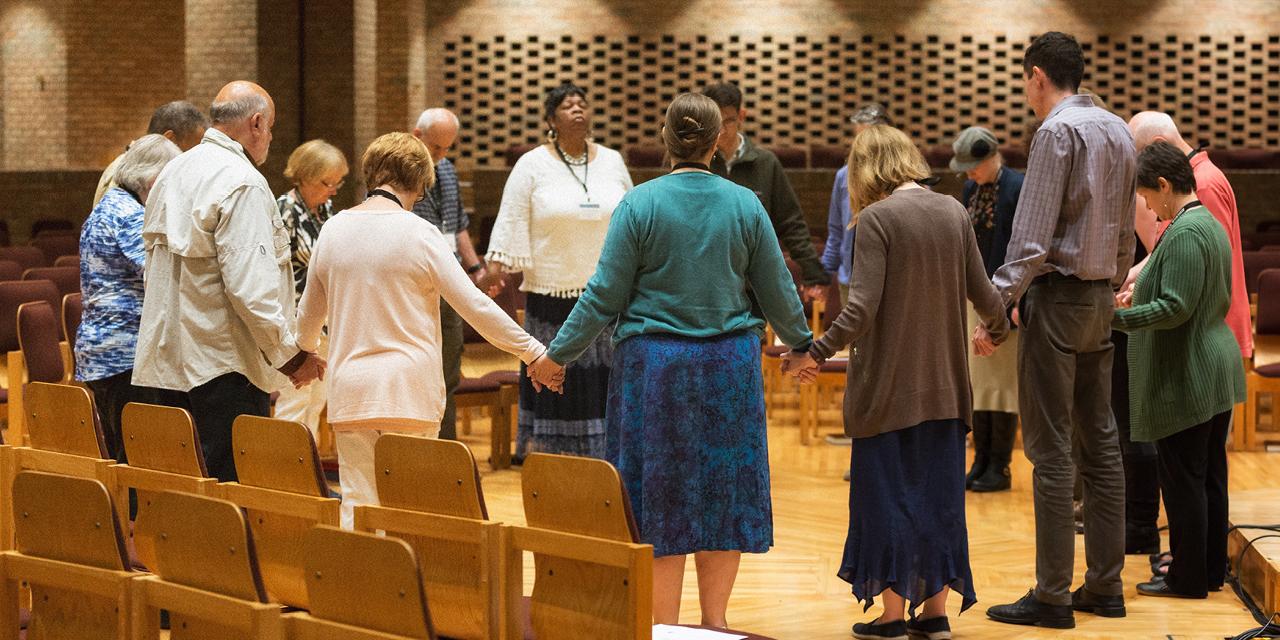Introduction
During this set of Bible studies we aim to provide lessons that focus specifically on each of the actions within the worship service. With the Scriptural pattern as our starting point, we will explore each part of the liturgy. The lessons will include
1. Preparation for Worship
2. The Opening of Worship
3. The Service of Renewal in Grace
4. Congregational Song
5. The Reading of Scripture
6. Proclaiming the Word
7. The Prayers of the People
8. Affirmations and Professions
9. Responding in Praise and Thanks
10. The Service of Baptism
11. The Service of the Lord's Supper
12. The Closing of Worship
It is our prayer that your Bible study group will be blessed by these studies and your worship will become richer. We welcome your suggestions and reactions. Please contact us though our profile link at top.
Lesson 1 See all lessons
Scripture: Psalm 15 and John 4:21-24
When you stop to think about it, worship is a rather challenging activity. We aim to engage in a dialog with a divine and invisible Being. We aim to meet with someone we are not able to see!
It is difficult, therefore, to overstate the importance of adequate preparation for good worship. We can only imagine the opportunities for good worship that never really happened because someone was unprepared. Missed opportunities are all too common. Yet, nothing is quite as satisfying as knowing that our thorough preparation has helped make worship a very rich time in fellowship with God.
When the Israelites ascended Mt. Zion on the way to worship, they did not go lightly. They knew they were on their way to a royal gathering, and they gave great care to this event. In Psalm 15 David talks about going to "your sanctuary" and "your holy hill." What a sacred destination! No wonder he proceeds to cite the personal qualifications of those who may comfortably go there. His point is that no one may simply barge in on the royal Lord. It takes a prepared heart. You'll find many of the same thoughts and convictions expressed in Psalm 24. Read through the Psalms of Ascent (120-134), and note their cultivation of spirit as they approached worship.
When Jesus spoke to the woman at the well in John 4, the conversation turned to worship. Their concern was not only where the worshiping was done (on Mt. Gerizim or in Jerusalem), but also how and in what spirit it was done (in spirit and in truth) (John 4:24). The phrase "in spirit and in truth" carries several levels of meaning, but through all its meanings runs the thread that teaches us the preparation of our spirit is more important than external circumstances or the location of our worship. Because of who God is, how we worship matters! And, therefore, so does our careful preparation.
We can conclude, therefore, that it is possible to "come to church" and still miss worship. And good preparation will likely be the key that makes the difference.
Areas of Preparation
The second lesson will focus on The Gathering or Opening part of worship and its importance, but first there are a few areas prior to the service that deserve our attention.
1. Internal preparation of heart. Each worshiper carries responsibility for personal preparation of heart. If God calls us to worship him "in spirit and in truth" (John 4:24), then we must ask questions about the state of our spirit. Read Psalm 15 again and listen to David in verses 2-5 speak about the integrity of heart and life that is necessary for those who come to the Lord's house. Yet, how often do we ask ourselves questions about our readiness of heart to worship?
2. Pre-arrival preparation. We may want to call it "pre-Sabbath" preparation. We can learn from the Jews who believe Sabbath begins at sundown. Our activities on the evening before worship will have a formative affect, positively or negatively, on our readiness for worship Sunday morning. Also, our personal schedule between rising and the beginning of worship on Sunday morning will have a great deal of influence on our readiness of spirit. Have we raced, or was it done leisurely? How many of us consider that?
3. Pre-service preparation. The short period of time between our arrival at church and the beginning of the worship service is also a critical period of time. Our interaction with friends reminds us that we are here as part of a body in relationship with others. A short while to quiet our spirits will enable us to leave some distractions behind and center ourselves in God. A time of reflective prayer can open our spirit to engage in conversation with God. Even the visual appearance of the worship space will have an impact on our readiness. How conscious are we of these critical minutes?
Worship Leaders
Preparation on the part of those who are called to lead worship is so important it warrants special consideration. Those who stand between God and his people for this important worship conversation must be personally prepared for this role. Whether they are prepared or not will have a significant influence on others.
The heart-preparation of a worship leader is doubly important. The responsibility of worship leaders during the days preceding the worship service is not only to prepare the liturgy and its many parts adequately but also to take care for their own spirits. Times of prayer, reflection, and drawing close to God are necessary preparations for worship leadership.
We have spoken at length in our book (Designing Worship Together) about the work of planning worship together. Even after the worship service has been planned and printed, worship leaders have personal preparation to do.
Nearly all of this preparation among worship leaders will depend on good communication and healthy relationships together. Make sure that all leaders have had face-to-face conversations before the service begins. Are all clearly aware of the theme of this service, especially if some who will lead were not involved in planning the service? Is everyone aware of his or her role? Is it clear how transitions will be made? Are there any lingering questions? Can you identify any potential areas of distraction?
All who will participate in worship leadership should gather for a time of prayer together before the service begins. Let them not only prepare their own heart, but put their hearts together with the hearts of others.
Aids to Preparation
Perhaps your group could brainstorm and put together a list that will help in your preparation. We encourage you to share it with the congregation through your bulletin or newsletter. For starters we would point to these considerations:
1. Provide information about the theme of worship for next week. In the bulletin for this week, point to next week to create anticipation. Let the bulletin speak about the sermon theme and passage and special events in worship for next week. Some churches provide devotional guides for the week in anticipation of next week, particularly in special worship seasons.
2. Communicate with the members of the congregation during the week about pastoral needs and prayer requests that have arisen. Many churches use a prayer line or email to send out such information. Worshipers then can come on Sunday with a greater awareness of the life of the body.
3. Use your congregation's website to provide information and reflections to encourage worshipers. Provide ideas and reflections about worship in general. In addition to information about the life of your congregation, post information about the sermon and passage for next Sunday's worship, including perhaps ideas and questions to reflect on.
4. Take a look at your narthex or lobby space. Is it an inviting space for worshipers to gather? Is it sufficient in size? Is it welcoming? What tone does it set for worshiping together?
5. Encourage worshipers to arrive early enough to meet others, have time for personal reflection, and be ready to enter the worship space before the service begins. Stragglers who enter worship after it has begun can be distracting to others.
6. Provide gathering music that will set a worshipful atmosphere. Let the gathering music be a transition time from the busy world into the presence of God. An instrumental prelude can be an effective bridge into worship and singing.
Tips for Discussion Leaders
This lesson has two goals. First, we want to highlight the vital importance of paying attention to the preparation for worship. Preparation happens both by the worship leaders and by worshipers in the pew. Some of it happens during the brief period of time before worship begins; some of it happens earlier than that. Second, we also want this to be an opportunity for your group/committee to evaluate what could be improved to better assist your congregation in its preparation efforts.
Discussion Starters
1. Describe a "prepared worshiper." Psalm 15 and John 4:24 should help you. What would you look for in such a person?
2. Assess the level of communication among those who are worship leaders? Are they in touch with each other as much as they ought to be? What could be improved?
3. What distracting habits do you spot among your worshiping community? Make a list of possible ways in which they can be addressed.
4. What intentional efforts are worth reinforcing and encouraging because they are a positive influence in your congregation's readiness for worship each week?
Further Reading
"Worship as Listening and Responding"
"Worship as Covenant Renewal"
Chapter 5, "Keeping This Sabbath," Receiving the Day, Dorothy Bass (Jossey-Bass, 2000), pp. 63-77.

